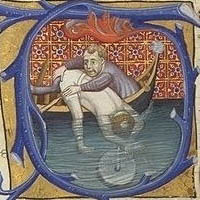Clement of Rome
On Wednesday evenings at our worship service, we usually remember a saint, learning more about their life and how we see Christ in that person. I am away on vacation and there will be no Wednesday evening worship, so here is a bit about the saint for November 23—Clement of Rome.
 Clement is known as the third Bishop of Rome and so appears in charts showing the popes in a line back from the current pope to the apostle Peter. Yet, Clement was Bishop of Rome well before that office held more power than that of Bishop of any other city. The tradition says that Clement was executed by being tied to an anchor and thrown into the sea. It is common to find a church in a port city named for Clement and he is often depicted in art with an anchor, or as shown here in an illuminated manuscript with St. Cyril recovering his body centuries later 868 a.d.
Clement is known as the third Bishop of Rome and so appears in charts showing the popes in a line back from the current pope to the apostle Peter. Yet, Clement was Bishop of Rome well before that office held more power than that of Bishop of any other city. The tradition says that Clement was executed by being tied to an anchor and thrown into the sea. It is common to find a church in a port city named for Clement and he is often depicted in art with an anchor, or as shown here in an illuminated manuscript with St. Cyril recovering his body centuries later 868 a.d.
 Clement's thought is best preserved for us today in a well attested letter he wrote to the church in Corinth around the year 96 a.d. His letter was frequently read in churches, but was not considered for inclusion in the Bible as he was neither an apostle nor the disciple of one of Jesus' apostles. Clement's letter to the Corinthians also uses many Old Testament figures as examples of the faith including Abraham, Lot, Rahab and David.
Clement's thought is best preserved for us today in a well attested letter he wrote to the church in Corinth around the year 96 a.d. His letter was frequently read in churches, but was not considered for inclusion in the Bible as he was neither an apostle nor the disciple of one of Jesus' apostles. Clement's letter to the Corinthians also uses many Old Testament figures as examples of the faith including Abraham, Lot, Rahab and David.
The letter bears some resemblance to Paul's letters to the Corinthians as once again the Christians in that city are being called back to faithfulness. Clement also includes a section on Christian love as Paul had done in I Corinthains 13 (which is the most popular scripture reading for a wedding). Rather than telling more about Clement, I'll close with a quote from his section on love
 Clement is known as the third Bishop of Rome and so appears in charts showing the popes in a line back from the current pope to the apostle Peter. Yet, Clement was Bishop of Rome well before that office held more power than that of Bishop of any other city. The tradition says that Clement was executed by being tied to an anchor and thrown into the sea. It is common to find a church in a port city named for Clement and he is often depicted in art with an anchor, or as shown here in an illuminated manuscript with St. Cyril recovering his body centuries later 868 a.d.
Clement is known as the third Bishop of Rome and so appears in charts showing the popes in a line back from the current pope to the apostle Peter. Yet, Clement was Bishop of Rome well before that office held more power than that of Bishop of any other city. The tradition says that Clement was executed by being tied to an anchor and thrown into the sea. It is common to find a church in a port city named for Clement and he is often depicted in art with an anchor, or as shown here in an illuminated manuscript with St. Cyril recovering his body centuries later 868 a.d.  Clement's thought is best preserved for us today in a well attested letter he wrote to the church in Corinth around the year 96 a.d. His letter was frequently read in churches, but was not considered for inclusion in the Bible as he was neither an apostle nor the disciple of one of Jesus' apostles. Clement's letter to the Corinthians also uses many Old Testament figures as examples of the faith including Abraham, Lot, Rahab and David.
Clement's thought is best preserved for us today in a well attested letter he wrote to the church in Corinth around the year 96 a.d. His letter was frequently read in churches, but was not considered for inclusion in the Bible as he was neither an apostle nor the disciple of one of Jesus' apostles. Clement's letter to the Corinthians also uses many Old Testament figures as examples of the faith including Abraham, Lot, Rahab and David.The letter bears some resemblance to Paul's letters to the Corinthians as once again the Christians in that city are being called back to faithfulness. Clement also includes a section on Christian love as Paul had done in I Corinthains 13 (which is the most popular scripture reading for a wedding). Rather than telling more about Clement, I'll close with a quote from his section on love
Let him who has love in Christ keep the commandments of Christ. Who can describe the [blessed] bond of the love of God? What man is able to tell the excellence of its beauty, as it ought to be told? The height to which love exalts is unspeakable. Love unites us to God. Love covers a multitude of sins. Love beareth all things, is long-suffering in all things. There is nothing base, nothing arrogant in love. Love admits of no schisms: love gives rise to no seditions: love does all things in harmony. By love have all the elect of God been made perfect; without love nothing is well-pleasing to God. In love has the Lord taken us to Himself. On account of the Love he bore us, Jesus Christ our Lord gave His blood for us by the will of God; His flesh for our flesh, and His soul for our souls.
Ye see, beloved, how great and wonderful a thing is love, and that there is no declaring its perfection. Who is fit to be found in it, except such as God has vouchsafed to render so? Let us pray, therefore, and implore of His mercy, that we may live blameless in love, free from all human partialities for one above another. All the generations from Adam even unto this day have passed away; but those who, through the grace of God, have been made perfect in love, now possess a place among the godly, and shall be made manifest at the revelation of the kingdom of Christ. For it is written, “Enter into thy secret chambers for a little time, until my wrath and fury pass away; and I will remember a propitious day, and will raise you up out of your graves.”
Blessed are we, beloved, if we keep the commandments of God in the harmony of love; that so through love our sins may be forgiven us. For it is written, “Blessed are they whose transgressions are forgiven, and whose sins are covered. Blessed is the man whose sin the Lord will not impute to him, and in whose mouth there is no guile.” This blessedness cometh upon those who have been chosen by God through Jesus Christ our Lord; to whom be glory for ever and ever. Amen.







0 Comments:
Post a Comment
<< Home